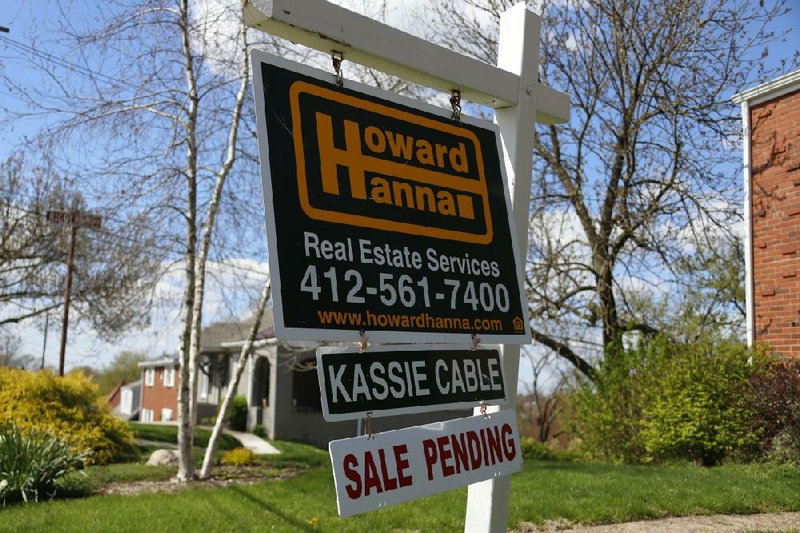An index of contract signings to buy existing U.S. homes slumped to a record low in April as coronavirus lockdowns thwarted prospective buyers.
The National Association of Realtors said Thursday that its pending home sales index plunged 21.8% from March to a level of 69, the largest decline registered in data going back to 2001. Pending home sales have fallen 33.8% from a year ago. The index is a barometer of sales over the next two months when the transactions are completed.
Sales dropped sharply from a month earlier in all four U.S. regions, including a 20% decline in the West and a 15.4% slide in the South.
Residential real estate over the past two months, associated with the start of the peak selling season, has suffered from efforts to contain the coronavirus pandemic.
[CORONAVIRUS: Click here for our complete coverage » arkansasonline.com/coronavirus]
At the same time, there are signs that home sales have reached a trough and could rebound. Low mortgage rates have supported buyer demand. New-home sales were predicted to tank in April but instead moved slightly higher. According to U.S. Census Bureau data, new-home sales were up 1% last month.
"The coronavirus pandemic has generated any number of nasty surprises over the past few months, but the unexpected strength in April new-home sales may be the first pleasant surprise yet -- and the clearest indicator so far that housing, so unlike the last time around, will be a source of relative strength during this downturn," said Matthew Speakman, a Zillow economist. "New-home sales are often a more current measure of activity than existing-home sales, and it seems clear that after some initial wobbliness, the market has certainly stabilized."
"While coronavirus mitigation efforts have disrupted contract signings, the real estate industry is 'hot' in affordable price points with the wide prevalence of bidding wars for the limited inventory," Lawrence Yun, the Realtors association's chief economist, said in a statement. "In the coming months, buying activity will rise as states reopen and more consumers feel comfortable about home-buying in the midst of the social distancing measures."
According to the latest data released Thursday by Freddie Mac, the 30-year fixed-rate average sank to a record-low 3.15% with an average 0.8 point. (Points are fees paid to a lender equal to 1% of the loan amount and are in addition to the interest rate.) It is the lowest recorded since Freddie Mac began tracking mortgage rates in 1971, and it surpassed the previous historic low of 3.23% set in late April. The 30-year fixed rate, which was 3.24% a week ago and 3.99% a year ago, has set new lows three times in just the past few months.
Freddie Mac, the federally chartered mortgage investor, aggregates rates from 125 lenders across the country to come up with national average mortgage rates. It uses rates for borrowers with flawless credit scores, which are not available to every borrower.
The 15-year fixed-rate average fell to 2.62% with an average 0.7 point. It was 2.7% a week ago and 3.46% a year ago. The five-year adjustable-rate average slid to 3.13% with an average 0.4 point. It was 3.17% a week ago and 3.6% a year ago.
"The low-rate environment is a result of investors continuing to prefer the safety of bonds and [Federal Reserve] buying," said Danielle Hale, chief economist at Realtor.com. "Low rates are energizing home buyers with a boost in affordability and are bringing them back to the housing market, despite the swirling economic uncertainty."
Although buyers may have been hoping the pandemic would cause home prices to fall, that hasn't been the case so far. Home values climbed 4.4% nationally in March, according to the S&P Case Shiller index released this week.
"Relative to the broader economy, the housing market -- particularly home prices -- have gotten away more or less scot-free so far," Speakman said.
Meanwhile, with home buyers returning, mortgage applications picked up this week. According to the latest data from the Mortgage Bankers Association, the market composite index -- a measure of total loan application volume -- increased 2.7% from a week earlier, mainly because of the greater number of purchase applications. The purchase index moved higher for the sixth week in a row, rising 9%, and was up 54% from early April. Most notably, the purchase index gained 9% year-over-year, the first annual increase since the pandemic hit.
The refinance index slipped 0.2% but was 176% higher than it was the same time last year. The refinance share of mortgage activity accounted for 62.6% of applications.
Information for this article was contributed by Josh Boak of The Associated Press, by Vince Golle of Bloomberg News and by Kathy Orton of The Washington Post.
Business on 05/29/2020
